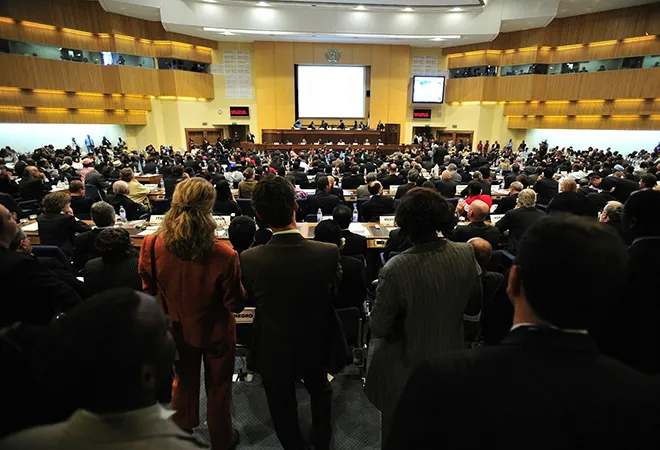
This article is part of the series — What to Expect from International Relations in 2021.
The multilateral frameworks that were established in the post-World War-II era opened a new chapter for strengthening global governance and international cooperation. These structures comprised of formal institutions with independent bureaucracies, where a large number of countries would come together to negotiate and devise norms to address global challenges.
However, the ideal vision of global cooperation has slowly dissipated. Today, consensus seems impossible and reforms remain elusive, while vested interests and institutional inertia continue to hamper decision-making. For instance, the Doha round of trade talks has been all but abandoned, while the expansion of permanent seats at the UN Security Council appears unattainable. The COVID-19 pandemic has brought into sharp relief the weaknesses of multilateralism — as countries questioned the utility of these organisations.
Today, consensus seems impossible and reforms remain elusive, while vested interests and institutional inertia continue to hamper decision-making.
As such, minilaterals are viewed as a solution to address the inefficiencies of multilateralism and provide a viable alternative for cooperation and global governance. They allow a group of countries with shared interests and values to bypass seemingly moribund frameworks, and resolve issues of common concern. The G20 is one such example, which was established as a response to the 2008 global financial crisis to foster economic cooperation between the world’s major economies. Similarly, minilaterals can also provide a forum to strengthen defence and security cooperation in new regional theatres, such as the Indo-Pacific. Because of the importance of security cooperation in this region, a range of minilaterals, such as the QUAD, the India-Japan-US trilateral and the India-France-Australia trilateral have been created to advance the interests of like-minded countries.
These arrangements are ad-hoc, flexible and voluntary, and follow a bottom-up approach as opposed to a top down one. With a smaller membership, they can expedite decision-making and facilitate policy coordination on important focus areas. They also provide an avenue for participation of countries like India, who lack a similar decision-making capacity in forums like the UN Security Council.
With a smaller membership, they can expedite decision-making and facilitate policy coordination on important focus areas.
At the same time, there are questions if a patchwork of disaggregated frameworks can indeed address inefficiencies of multilateralism. Minilaterals promote voluntary and non-binding targets commitments, as opposed to legally binding ones. This gives rise to compliance and accountability issues, which can in turn frustrate the objectives of global governance and international cooperation. For instance, the G20’s Mutual Assessment Process (MAP) — where members share national economic plans and disclose its potential negative impact — has been criticised for being ‘toothless’ in practice. In this context, it is difficult to measure — qualitatively and quantitatively — the actual outcomes that are being achieved through minilaterals.
Further, preference for minilaterals can undermine the efficiency and legitimacy of international organisations. This will reduce the incentive for countries to engage with multilateral frameworks — a possibility that not only impacts their relevance, but can also hamper their work programmes. For instance, WHO and UNICEF regional offices work with governments to provide important technical and managerial support to implement domestic schemes in health, nutrition, education and child protection. Multilateral organisations also help build consensus towards legally binding treaties, such as the UN Convention on Law of the Sea, which provides a rules-based framework that forms the basis for minilateral cooperation as well.
It is difficult to measure — qualitatively and quantitatively — the actual outcomes that are being achieved through minilaterals.
Minilaterals can further lead to fragmentation of global governance mechanisms and foster the creation of mutually exclusive power blocs. There is the China-led Shanghai Cooperation Organisation and the Asian Infrastructure and Investment Bank on tone hand, and the Western-led G20 and G7 on the other. The formation of competing blocs can escalate great power competition and diminish possibilities for great power cooperation.
Though minilaterals expedite consensus building and facilitate policy coordination, it is unclear if they are in fact better than multilateral organisations in achieving concrete outcomes. Regarding minilaterals as a panacea for all the ills of multilateralism risks prioritising short-term gains over long term ones — the costs of which could be higher than anticipated.
The views expressed above belong to the author(s). ORF research and analyses now available on Telegram! Click here to access our curated content — blogs, longforms and interviews.




 PREV
PREV


